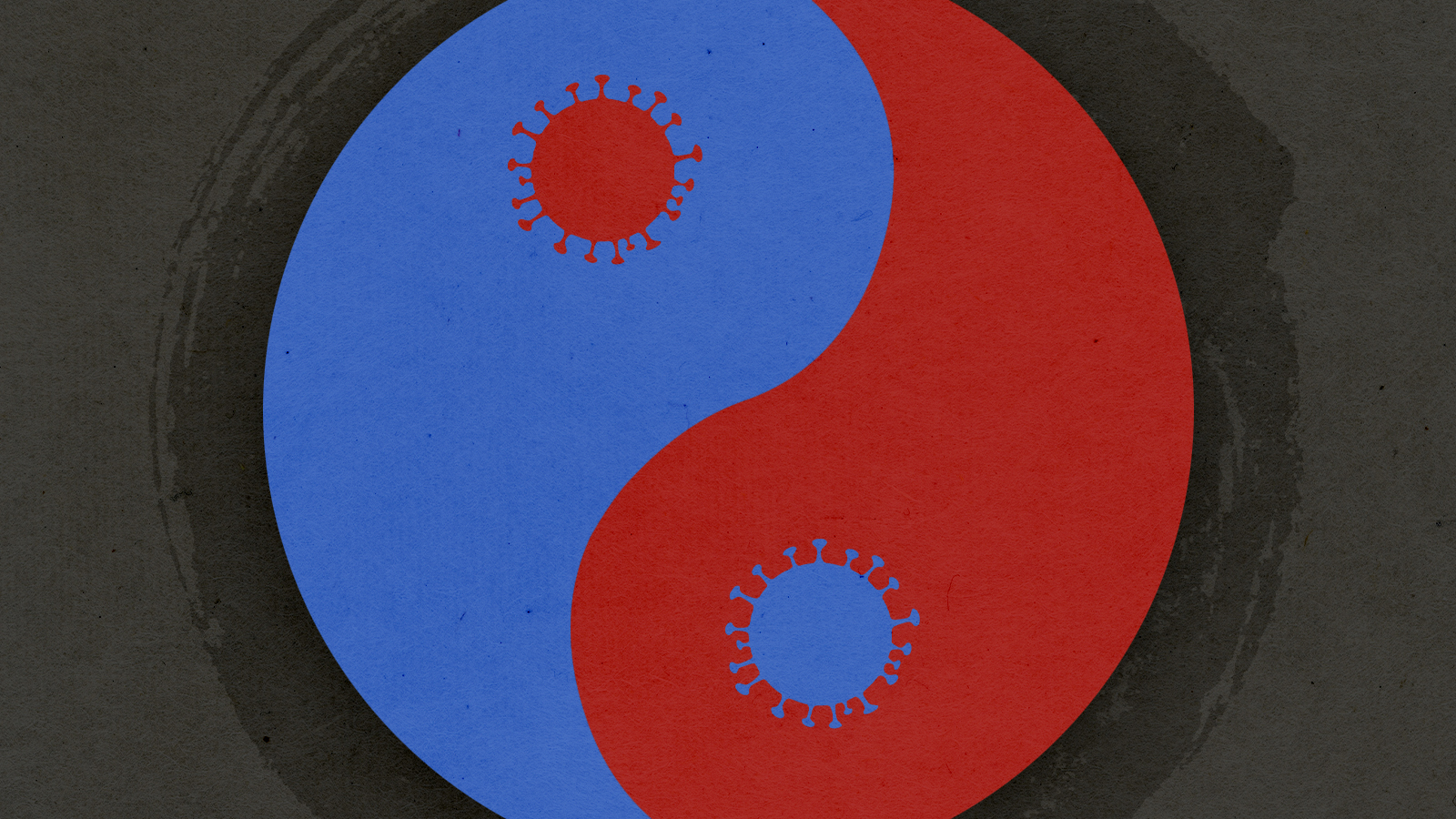How Omicron scrambled Democrats' responses to COVID


A free daily email with the biggest news stories of the day – and the best features from TheWeek.com
You are now subscribed
Your newsletter sign-up was successful
For much of the last two years, differing approaches to the COVID-19 pandemic mapped neatly onto our political divisions. The right battled against lockdowns and other protective measures, while folks on the left doggedly wore masks and celebrated vaccines. Polarization won again. But the latest wave of coronavirus cases — probably fueled by the Omicron variant — has scrambled those lines: While conservatives remain anti-everything, Democrats and liberal pundits seem confused and at odds about the way forward.
This is especially apparent at the state and local levels. In New York, Gov. Kathy Hochul this week ordered a new mask mandate, and outgoing Mayor Bill de Blasio has announced a plan to distribute masks and tests, with the city's restaurants closed to anybody who hasn't been vaccinated. But Colorado Gov. Jared Polis (D), on the other hand, said this week he wouldn't try to impose a mandate on his state, declaring that "the emergency is over" and that "at this point, if you haven't been vaccinated, it's really your own darn fault." Other Dem governors, like Michigan's Gretchen Whitmer and Kansas' Laura Kelly have come out publicly against President Biden's vaccine mandate, complicating his efforts to protect Americans against the virus.
You can see these divisions in the culture, too. Just one example: This week, The Atlantic's Ian Bogost wrote about the despair he was feeling as Omicron becomes ascendant. "The coronavirus was once 'novel' because it was new," he wrote. "Now it feels both ancient and eternal." A minor backlash ensued. "Get vaccinated. Get the booster. Live your life for god's sake," responded Vox's Sean Illing. "This despair porn is ridiculous."
The Week
Escape your echo chamber. Get the facts behind the news, plus analysis from multiple perspectives.

Sign up for The Week's Free Newsletters
From our morning news briefing to a weekly Good News Newsletter, get the best of The Week delivered directly to your inbox.
From our morning news briefing to a weekly Good News Newsletter, get the best of The Week delivered directly to your inbox.
The debates are understandable. Every moment of hope ("hospitalizations are falling quickly in South Africa!") is quickly followed by a moment of dread ("maybe Omicron isn't less severe after all"). America's scientific institutions haven't always acquitted themselves very well over the last two years. And there are legitimate questions about how to balance COVID precautions against our collective mental health and the need for our kids to go to school. More than that, we're all kind of tired of this battle, and ready to move on.
The fact that many American hospitals are at the breaking point goes under-mentioned in these discussions, however.
In the absence of clarity, our leaders fall back on old habits. In a deep-blue state like New York, Hochul can act aggressively in the knowledge that voters won't punish Democrats. In red and purple climes, Democratic governors have an incentive not to anger conservative voters too much. It all makes sense. But it also means our collective and individual responses to COVID, which were never that coherent to begin with, are becoming less so. Let's hope we don't regret it.
A free daily email with the biggest news stories of the day – and the best features from TheWeek.com
Joel Mathis is a writer with 30 years of newspaper and online journalism experience. His work also regularly appears in National Geographic and The Kansas City Star. His awards include best online commentary at the Online News Association and (twice) at the City and Regional Magazine Association.
-
 One great cookbook: Joshua McFadden’s ‘Six Seasons of Pasta’
One great cookbook: Joshua McFadden’s ‘Six Seasons of Pasta’the week recommends The pasta you know and love. But ever so much better.
-
 Scientists are worried about amoebas
Scientists are worried about amoebasUnder the radar Small and very mighty
-
 Buddhist monks’ US walk for peace
Buddhist monks’ US walk for peaceUnder the Radar Crowds have turned out on the roads from California to Washington and ‘millions are finding hope in their journey’
-
 Big-time money squabbles: the conflict over California’s proposed billionaire tax
Big-time money squabbles: the conflict over California’s proposed billionaire taxTalking Points Californians worth more than $1.1 billion would pay a one-time 5% tax
-
 Did Alex Pretti’s killing open a GOP rift on guns?
Did Alex Pretti’s killing open a GOP rift on guns?Talking Points Second Amendment groups push back on the White House narrative
-
 Washington grapples with ICE’s growing footprint — and future
Washington grapples with ICE’s growing footprint — and futureTALKING POINTS The deadly provocations of federal officers in Minnesota have put ICE back in the national spotlight
-
 Trump’s Greenland ambitions push NATO to the edge
Trump’s Greenland ambitions push NATO to the edgeTalking Points The military alliance is facing its worst-ever crisis
-
 Why is Trump threatening defense firms?
Why is Trump threatening defense firms?Talking Points CEO pay and stock buybacks will be restricted
-
 The billionaires’ wealth tax: a catastrophe for California?
The billionaires’ wealth tax: a catastrophe for California?Talking Point Peter Thiel and Larry Page preparing to change state residency
-
 Trump considers giving Ukraine a security guarantee
Trump considers giving Ukraine a security guaranteeTalking Points Zelenskyy says it is a requirement for peace. Will Putin go along?
-
 Bari Weiss’ ‘60 Minutes’ scandal is about more than one report
Bari Weiss’ ‘60 Minutes’ scandal is about more than one reportIN THE SPOTLIGHT By blocking an approved segment on a controversial prison holding US deportees in El Salvador, the editor-in-chief of CBS News has become the main story
